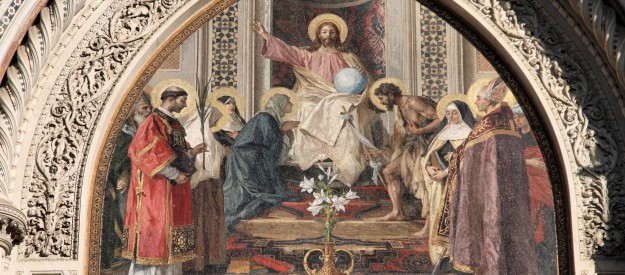"We are losing our attitude of wonder, of contemplation, of listening to creation and thus we no longer manage to interpret within it what Benedict XVI calls 'the rhythm of the love-story between God and man.'"
+ Pope Francis
Nature and the Mass

During an eco-talk in another diocese, a participant shared with me how her parish celebrated Masses for creation. Special readings were read and hymns were sung, and the entrance procession, she said, included a child carrying an Earth-like beach ball, which would be placed before the altar for the duration of the Mass.
The ball, she said, represented creation.
I hated to burst her bubble, but I explained that the Mass has always been a celebration of creation. Our gifts of bread and wine are actual components of creation that are brought to the altar so that the celebrant may consecrate the Eucharist.
Not only that, but the grace the flows from the Mass—that pours forth from the very body and blood of Jesus Christ—not only embraces those in attendance but contributes to the restoration of the entire created order.
Unfortunately, this ancient reality seems to have been forgotten.
Elsewhere, members of religious orders and Catholic eco-groups are exploring the idea of adding a liturgical "season of creation" to the current liturgical year. This is a disturbing proposal rising out of a lack of appreciation that the focus of the liturgical year is the Creator, not creation. More precisely, the liturgical year is a retelling of how God's inviolable love for us has entered human history for the redemption of human souls and the entire cosmos.
After all, at the core of our Catholic faith is the proclamation of the Gospel of Jesus Christ, which is rooted deeply in the intimate relationship between the Creator and creation for the salvation by the former of the latter.
This is achieved chiefly, but not exclusively, through the sacraments.
Grace elevates nature
Of course, God can elevate and restore nature anyway He pleases. But Christ empowered the Church to mediate grace in seven specific ways. Not only that, but each of the seven sacraments uses matter—that is, the created order—in ways proper to each.
Baptism employs water to usher in new life and to cleanse us from our sins. We understand the reality of baptism from our experiences with water—from the waters of birth itself, from the quenching our thirsts, and from our use of water for hygiene.
Confirmation and Anointing of the Sick employ botanical oils much like doctors have used always and that, even today, sports therapists rub on sore muscles to return the weary and injured to full strength.
The Sacrament of Reconciliation employs the very conversations of the priest and penitent—words spoken and heard, which become part of a perfect, heavenly dialogue of repentance and forgiveness.
Marriage is the natural union of a male and female, elevated and ennobled, to cooperate with God’s ongoing creation by bringing into existence new human life. New human souls.
The priesthood is the elevation of a man to an Alter Christus—a spiritual father who gives up his life so that he may shepherd and teach and to bring the sacraments to his flock, especially the sacrament of the Eucharist.
And here’s where we get to the Mass: The celebration of the Eucharist begins with the offering of bread and wine—fruits of the earth and the work of human hands. The community offers this bread and wine to the priest, who accepts it on our behalf and brings it to the altar of God, who cannot be outdone in generosity, and thus returns our offerings with His very presence—His Body and Blood, Soul and Divinity.
Thus, we receive Him who created all, so that we, and all, may be restored.
Every Mass is a Mass for creation
Think about it. At every Mass, we offer creation to the Creator. At every Mass, the Creator comes to us to elevate and heal us, his creatures, as well as to restore the innate goodness He established in the beginning.
This truth is a stunning reality. But for some reason, we seem to have forgotten it.
Forgetting this link between nature and our faith has blinded us to the intrinsic nature of who we are as disciples of Jesus Christ.
Thus, two camps arise, each championing one of two problems. Problems that border on heresy. By not seeing the Catholic-creation link, some of us reject the call to care for our environment while others believe we must add the care of creation to our liturgies and even to our liturgical year.
I would hope that you and I do not make those mistakes.
Rather, let’s embrace the sacramental nature of the Church as a means to build unity and as a way forward—hand-in-hand with our Creator—to bring His good news and His grace to all lands and all nations, so that we may care for the former and baptize the latter, which we have been commissioned to do, not in our own names, but in the Name of the Father, and of the Son, and of the most Holy Spirit.
Photo: Bigstock/Jesus Christ pantokrator - Cathedral of Santa Maria del Fiore


















